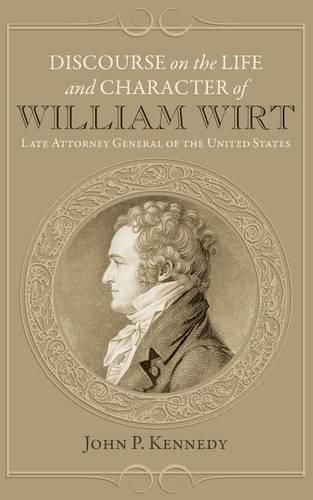Readings Newsletter
Become a Readings Member to make your shopping experience even easier.
Sign in or sign up for free!
You’re not far away from qualifying for FREE standard shipping within Australia
You’ve qualified for FREE standard shipping within Australia
The cart is loading…






Wirt made headlines most recently in 2005, but for an unfortunate reason. Someone had broken into the Wirt Tomb, located in the Congressional Cemetery in Washington DC, and his skull was taken and later found in a tin box with gold letters announcing that it was the skull of Hon. Wm. Wirt. According to reports, it was found as a part of a larger skull collection, anonymously sent to a city council member’s office, and then confirmed by the Smithsonian Institution forensics team that it was indeed the skull of Wirt. It was never determined who stole the skull, or why there was an unaccounted infant’s remains found in the disturbed family tomb. Prior to his adventures in the afterlife, Wirt was best known for his eloquent and witty prosecution of Aaron Burr in his trial for treason, but he also argued many other major cases, including Gibbons v. Ogden, McCulloch v. Maryland and two cases involving Native American rights: Cherokee Nation v. Georgia and Worcester v. Georgia. He was the Attorney General from 1817-1929, serving under James Monroe and John Quincy Adams. After stepping down as Attorney General, Wirt went on to be a Presidential Candidate in the 1832 election, having been nominated by the Anti-Masonic Party, despite himself being a Freemason. He practiced law his whole life, and was known for giving lyceum lectures and writing on a whole variety of topics, including law, female education, French relations and past presidencies.
$9.00 standard shipping within Australia
FREE standard shipping within Australia for orders over $100.00
Express & International shipping calculated at checkout
Wirt made headlines most recently in 2005, but for an unfortunate reason. Someone had broken into the Wirt Tomb, located in the Congressional Cemetery in Washington DC, and his skull was taken and later found in a tin box with gold letters announcing that it was the skull of Hon. Wm. Wirt. According to reports, it was found as a part of a larger skull collection, anonymously sent to a city council member’s office, and then confirmed by the Smithsonian Institution forensics team that it was indeed the skull of Wirt. It was never determined who stole the skull, or why there was an unaccounted infant’s remains found in the disturbed family tomb. Prior to his adventures in the afterlife, Wirt was best known for his eloquent and witty prosecution of Aaron Burr in his trial for treason, but he also argued many other major cases, including Gibbons v. Ogden, McCulloch v. Maryland and two cases involving Native American rights: Cherokee Nation v. Georgia and Worcester v. Georgia. He was the Attorney General from 1817-1929, serving under James Monroe and John Quincy Adams. After stepping down as Attorney General, Wirt went on to be a Presidential Candidate in the 1832 election, having been nominated by the Anti-Masonic Party, despite himself being a Freemason. He practiced law his whole life, and was known for giving lyceum lectures and writing on a whole variety of topics, including law, female education, French relations and past presidencies.